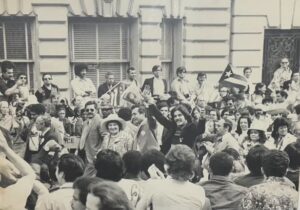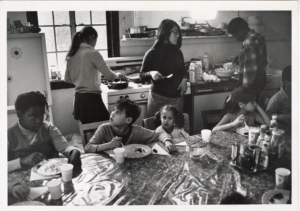Geraldo Rivera, the ground-breaking TV icon, will bring stories from his days representing the Harlem-based Young Lords to MEC’s Latine Heritage Celebration

By David Gil de Rubio | dgilderubio@mec.cuny.edu
When Geraldo Rivera takes his place on the podium as a panelist for “Latine Activism: From the Young Lords to the Present” (which kicks off at 3:45 p.m.), he’ll be sharing the stage with Young Lords founder Mickey Melendez.
It’s all part of the Medgar Evers College Latine Heritage Celebration, a CUNY-wide event that runs from 11 a.m. to 7 p.m. at the school’s Crown Heights campus on Friday, October 18.
And while Rivera has spent the past few decades as an award-winning fixture on American television, it was his time spent as a legal representative for the East Harlem-based Puerto Rican activist group that was his springboard to becoming a storied member of the Fourth Estate. His introduction to the Young Lords Organization (YLO) was a memorable one.
“I read a story or two about the [Young Lords] and asked some people about them,” Rivera recalled. “They were uptown and I was downtown on the Lower East Side—they were in Spanish Harlem. They decided on this flamboyant and very dramatic seizure of the Methodist Church on East 111th Street and Lexington Avenue. As Pablo Guzman described in my book, he remembered me kind of barging in and saying something like, ‘You’re the first of the Puerto Rican warriors and you need a Puerto Rican lawyer and now I’m your lawyer.’”
Originally founded in Chicago as turf-defending gangbangers in 1960, the Young Lords evolved into a civil rights and human rights organization fighting for empowerment of Black and Brown people in lower income communities, first in Chicago (1968) and later in New York (1969).
Taking a page from their allies in The Black Panthers, the Young Lords’ drive resulted in the creation of neighborhood programs addressing inequities in health care and housing along with other issues including food insecurity and empowerment that were rooted in the Puerto Rican diaspora. When a group of like-minded young Boricuas took up the mantle in El Barrio, it was hard for Rivera not to notice.

“They were the first Puerto Rican group in my lifetime not to be interested so much in the focus of Puerto Rican independence, which had been the only Puerto Rican activist cause of my whole life,” Rivera explained. “Here they were interested in domestic/urban causes making things better. It was this amazing moment in history where you had these Puerto Rican, mostly college-educated but not entirely in terms of the leadership, working-class, middle class [activists]. It was an extraordinary group—David Gonzalez, Pablo Guzman, Felipe Luciano, Denise Oliver—I swear to God, it was as if we were changing the world. It really was a feeling that this organization was going to really lead not just the Puerto Rican community but principally the Puerto Ricans, to a new world.”
With a nod to what was going on in Vietnam, the YLO engaged in a number of offensives addressing the neglect imposed by the City of New York on residents of El Barrio.
Among the issues addressed were lackluster sanitation services (Garbage Offensive), the need for child care and free breakfast programs for children (Church Offensive) and horrific health care in the South Bronx (Lincoln Offensive). It was this community-driven focus that Rivera felt gave the idea of what it meant to be Nuyorican a distinct shot in the arm.
“[A major inflection point in Young Lords history was] the fact that the Young Lords saw as an entity, the Puerto Rican community in New York was not just a subsidiary of the Puerto Rican community in Puerto Rico,” he said.
“It was a separate and distinct community. It was different needs—Spanglish. Very proud of all things Puerto Rican, but also very engaged in social justice and wanting to carve out a better life for their families and their parents on East 100th Street or further uptown. It was also distinct from the Black Panthers in the Black community. There was a distinct, identifiable community of Nuyoricans that they gave birth to basically.”
By 1975, the Young Lords dissolved, long after Rivera had moved on to become a journalist for WABC in 1970.
He is quick to admit how YLO influenced him and a younger generation to tap into the DNA of social justice regarding issues that disproportionately affect people of color. It’s a sentiment that rings truer today more than ever.
“I think that is where people see the potential to have some leverage or ability to point at a wrong and advocate how to right it,” Rivera said.
“That’s what I would advocate—public lives, even if it’s only part-time public lives. Be proud of who you are, express it, be active. Just be involved. Run for office. Be AOC. The Puerto Rican community in the United States is never going to disappear. But it is very heavily Americanized. To be wistful and nostalgic is one thing, but now you have to have high energy, ambition to be somebody and succeed.
“And then use whatever extra energy or whatever it is—time or money—to do right. I think that the American Dream Puerto Rican style is alive and well.”